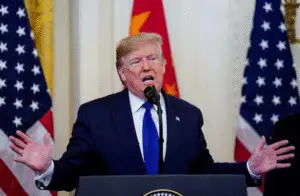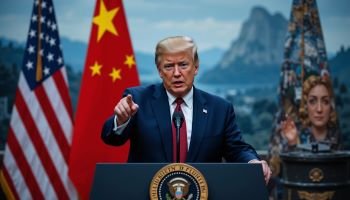📰 Trump Administration Warns China on Russian Oil, Threatens 100% Tariffs
In the latest business news update it has emerged that US warns China on Russian oil tariffs . here you will get all the updates and latest information related to this news so stay connected with Premiere News.
Washington, D.C. — President Donald Trump’s administration has issued a blunt warning to China over its increasing imports of Russian oil, signaling that Beijing could face tariffs of up to 100% if it continues supporting Moscow’s energy economy. The US warns China on Russian oil tariffs as part of a broader effort to tighten the financial noose on Vladimir Putin’s war machine.
Speaking to reporters after a high-stakes meeting in Stockholm, U.S. Treasury Secretary Scott Bessent stated that Trump has full authority to act under newly passed legislation. “We will not allow China or anyone to undercut American sanctions by doing business with Russia,” Bessent declared. “President Trump is ready to use every tool we have, and tariffs are just the start.”
🛢️ Russia’s Oil Exports Face U.S. Crackdown
The US warns China on Russian oil tariffs amid surging volumes of Russian crude reaching Chinese refineries, often at steep discounts. China has become Russia’s largest energy buyer, importing more than 2 million barrels of oil daily helping Moscow bypass Western restrictions.
President Trump has publicly called this behavior “economic betrayal” and warned that no country should expect to benefit from American markets while supporting America’s enemies.
“You can’t trade with us and fund Putin at the same time. That’s not how it works under my watch,” Trump said during a rally in Ohio on Sunday.
🇨🇳 China’s Response: Defiant but Cautious
China has responded defiantly, asserting its right to secure energy from “any source necessary.” During closed-door discussions in Sweden, Chinese diplomats reportedly told U.S. officials they would rather absorb high tariffs than submit to American pressure.
Still, the US warns China on Russian oil tariffs with the intention of testing China’s resolve. Recent messaging shifts in Chinese state-run media hint that Beijing may quietly reassess the political costs of remaining Moscow’s top energy customer.
Experts suggest China’s leadership understands the stakes. “This is no longer just about oil but it’s about global alignment,” said geopolitical strategist Amanda Luo of the Asia Insight Group. “And Trump is framing this as a loyalty test.”
🧾 Trump-Backed Legislation Adds Firepower
The warning isn’t idle talk. President Trump recently signed the Sanction Enforcement Act of 2025, passed with bipartisan support, allowing tariffs of up to 500% on any country violating U.S. sanctions. While no action has been taken yet, the framework exists and China appears to be the first major target.
The US warns China on Russian oil tariffs under the provisions of this law, and administration officials made clear that enforcement is likely if import volumes don’t decline.
“This isn’t theoretical anymore,” said Treasury adviser Mark Chen. “There is legal authority, presidential will, and bipartisan consensus. China should take note.”
🌍 Global Energy Markets on Edge
Markets responded quickly to the announcement. Brent crude futures rose to $73.60 per barrel, amid fears that a tariff-driven disruption in China–Russia energy ties could squeeze global supply chains.
The US warns China on Russian oil tariffs at a moment when the world is already grappling with tight supplies, slowdowns in OPEC production, and rising summer demand. Analysts warn that if Beijing scales back on Russian oil, prices could jump significantly.
On the flip side, if China ignores the warning, it risks facing retaliatory tariffs on its own exports to the U.S. especially tech hardware, solar panels, and rare-earth components.
⚖️ A Shift in Strategic Posture
This latest confrontation is emblematic of the Trump Doctrine: America First, with economic tools as the primary lever of foreign policy. Unlike the Biden-era multilateral sanctions approach, Trump prefers unilateral, hardline action with tariffs as his weapon of choice.
As the US warns China on Russian oil tariffs, Trump is also sending a clear message to European allies: follow America’s lead or risk becoming economically irrelevant. The president has repeatedly criticized Germany and France for what he calls “soft and slow” enforcement of Russian sanctions.

🔍 What’s Next for Beijing?
Sources within the Chinese government suggest internal divisions are growing. Some officials want to preserve energy deals with Russia, while others worry that escalating U.S. pressure could hurt China’s access to Western financial markets and technology.
The US warns China on Russian oil tariffs not just as punishment, but as a nudge pushing Beijing to weigh the benefits of cheap Russian oil against the risks of economic decoupling from the West.
Meanwhile, President Trump is doubling down. On Truth Social, he posted:
“China made a fortune off America. Now they’re bankrolling our enemies. Not on my watch!”
📌 Conclusion: High-Stakes Brinkmanship
As the US warns China on Russian oil tariffs, it marks a turning point in economic diplomacy. What began as an energy issue has now evolved into a high-stakes test of international resolve, national pride, and presidential strength.
With Trump at the helm, the U.S. is signaling that the era of quiet diplomacy is over. And if China keeps its energy tap open to Moscow, it may soon find the door to the U.S. market slamming shut.
Also read: PM Modi Slams Congress Over Operation Sindoor in Parliament Showdown
🔟 FAQ US warns China on Russian Oil Tariffs:
1. Why has the US warned China on Russian oil tariffs?
The US warns China on Russian oil tariffs because Beijing has significantly increased its purchases of Russian crude oil since the war in Ukraine began. These imports, often acquired at discounted rates, are seen by Washington as undercutting Western sanctions aimed at isolating the Kremlin financially. The Trump administration believes that China’s actions are enabling Russia to sustain its military operations in Ukraine, prompting the threat of up to 100% retaliatory tariffs.
2. What specific tariffs is the US threatening China with?
In response to China’s continued energy cooperation with Russia, the US warns China on Russian oil tariffs that could reach up to 100%. These tariffs would apply to Chinese exports to the U.S., especially in sectors like electronics, green energy components, and consumer goods. The tariffs are being considered under the newly enacted Sanction Enforcement Act of 2025, which authorizes secondary sanctions on any country trading energy with Russia.
3. Is there a legal basis for these tariffs under U.S. law?
Yes. The US warns China on Russian oil tariffs under the authority of the Sanction Enforcement Act of 2025, signed into law by President Donald Trump. This bipartisan legislation allows the U.S. government to impose high tariffs or other penalties on nations that continue to import Russian oil, gas, or uranium. The law is designed to close loopholes in existing sanctions by targeting buyers, not just suppliers.
4. How much Russian oil is China currently importing?
China is currently importing more than 2 million barrels per day of Russian oil, making it the largest buyer of Russian crude globally. This volume has steadily increased since 2022 and is a key reason the US warns China on Russian oil tariffs. Much of this oil is purchased at discounts and delivered via complex shipping routes that help circumvent Western tracking and enforcement mechanisms.
5. How has China responded to the U.S. warning?
China has reacted firmly, stating that it reserves the right to secure energy supplies from “any available source.” According to U.S. officials, Chinese negotiators in Stockholm claimed they would “rather absorb tariffs than compromise their energy sovereignty.” However, subtle shifts in Chinese media coverage suggest that internal discussions are ongoing. The US warns China on Russian oil tariffs in hopes of pressuring a policy reversal or reduction in Russian oil dependency.
6. What impact could these tariffs have on global oil markets?
If the US warns China on Russian oil tariffs and enforces them, global oil prices could rise. This is because any disruption to China’s oil sourcing from Russia may tighten global supply. Already, oil futures have shown modest gains in response to the threat. Conversely, if China ignores the warnings and the U.S. responds with tariffs, broader trade tensions could trigger volatility across energy, tech, and shipping markets.
7. Is the United States the only country pressuring China over Russian oil?
While the US warns China on Russian oil tariffs, other Western countries—especially in the EU—have also voiced concerns. However, the U.S. has taken the most aggressive stance, especially under President Trump’s “America First” foreign policy approach. European allies are more cautious, relying heavily on diplomacy and soft-pressure tactics. This makes the U.S. strategy unique in its use of hard economic leverage.
8. Could this lead to a broader trade war between the U.S. and China?
Yes, the possibility of a broader trade war cannot be ruled out. As the US warns China on Russian oil tariffs, Beijing may retaliate by imposing its own duties on American exports or restricting access to rare earth elements and critical minerals. Both economies are heavily interlinked, and escalating the conflict could impact sectors ranging from agriculture to semiconductors and clean energy.
9. What does this mean for U.S.–Russia–China relations going forward?
The situation marks a new phase of economic diplomacy. The fact that the US warns China on Russian oil tariffs signifies that energy trade is no longer just about economics—it’s now a tool of geopolitical alignment. How China responds may influence the future of its global image, its role in international institutions, and its long-term relationship with both Washington and Moscow.
10. What are the next steps if China ignores the warning?
If China refuses to reduce Russian oil imports, President Trump is likely to invoke executive authority to implement the proposed tariffs. The US warns China on Russian oil tariffs not as an empty threat, but as a real policy decision backed by law and political will. The administration may also lobby allies to apply similar pressure, aiming to isolate Beijing and shrink the global market for Russian energy exports.
For all latest news updates about politics, entertainment, technology, health and economy do visit Premiere News website, Facebook, Instagram and Twitter accounts.





One thought on “Urgent: 5 Alarming Reasons US Warns China on Russian Oil Tariffs”